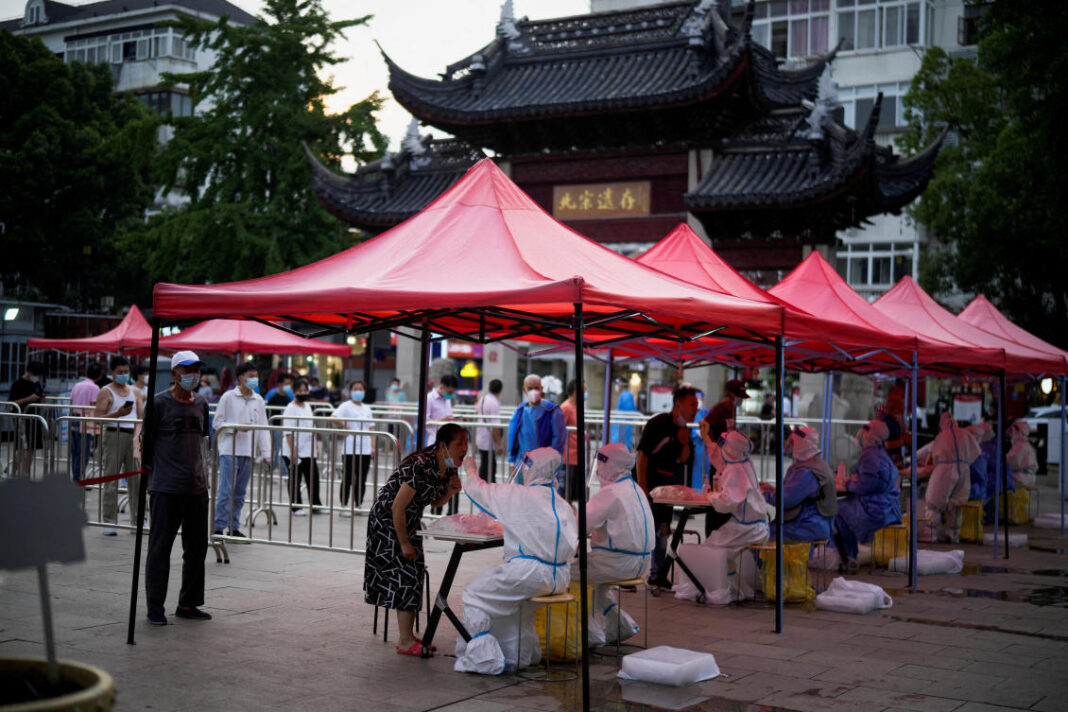SHANGHAI/BEIJING: Several large Chinese cities including Shanghai are on alert due to new clusters of COVID-19 infections, rolling out repeated mass testing or extending lockdowns on millions of residents, with some measures triggering a public outcry.China has reported an average of around 390 local daily infections in the seven days ending on Sunday, higher than about 340 seven days earlier, according to Reuters calculations based on official data as of Monday. That is tiny compared with a resurgence in other parts of Asia.China is adamant about implementing its dynamic zero COVID-19 policy of eliminating outbreaks as soon as they emerge. Previously when a flare-up became a major outbreak, local officials had been compelled to take tougher measures such as month-long lockdowns, even at the cost of economic growth.Persistent outbreaks and more closures could add pressure on the world’s second-largest economy, which contracted sharply in the second quarter from the first after widespread COVID-19 lockdowns jolted industrial production and consumer spending.The commercial hub Shanghai, yet to fully recover from the harsh two-month lockdown in spring and still reporting daily sporadic cases, plans to hold mass testing in many of its 16 districts and in some smaller areas where new infections had been reported recently, after similar testing last week.”There is still an epidemic risk at the community level so far,” the city government said in a statement.Shanghai reported more than a dozen new cases but none was found outside quarantined areas, local government data showed on Monday.”I’m speechless,” said a Shanghai resident surnamed Wang, already subject to testing every weekend at her residential compound. “It sounds like a waste of resources that doesn’t address the real problem.”The northern city of Tianjin, which launched multiple rounds of mass testing in recent months to curb earlier outbreaks, said on Monday it is again testing its more than 12 million residents, after two local infections were found.In the central Chinese city of Zhumadian, lockdowns for more than a million people in two towns under its jurisdiction are extended for a few days until Tuesday. Temporary lockdowns for over 3 million in four other towns have been extended to Monday. Zhumadian continues to report dozens of cases daily despite curbs last week.The southwestern city of Chengdu on Monday said it suspended various entertainment and cultural venues, widening such curbs over the weekend that had been limited to a few districts.The capital Beijing, after a week of zero local infections, found two local cases on Monday — one international flight crew member and the person’s roommate. Authorities have sealed up affected buildings.Authorities in the southern region of Guangxi said late on Sunday they removed two officials in the city of Beihai from their jobs for acting poorly in their COVID-19 response.The city of Beihai, with a population of 1.9 million and currently clocking over 500 infections, has launched multiple rounds of mass testing and locked down some areas.As of Sunday, over 2,000 tourists were stuck in the city.In the southern city of Guangzhou, COVID-19 control staffers broke down the locks of apartment doors without residents’ consent, stirring an outcry on social media over the weekend.Authorities in one district in Guangzhou on Monday apologized to residents.The issue was among the top 10 list of topics trending on China’s Twitter-like social media Weibo.”It’s too horrifying, too ridiculous,” wrote a Weibo user. “No humanity, no law.”In the northeastern city of Changchun, clear of local infections since mid-May, subway passengers were told to wear N95 masks throughout their rides. Many cities including Beijing only mandate surgical masks.Jin Dong-yan, a virology professor at the University of Hong Kong, said N95 respirators are able to offer better protection than surgical masks during major outbreaks, but could be of low cost-efficiency in areas of low COVID-19 risk.”In a city without cases, N95 mask mandate would be painful and inconvenient.”
Shanghai enforces new COVID-19 testing, some areas in China extend lockdown




